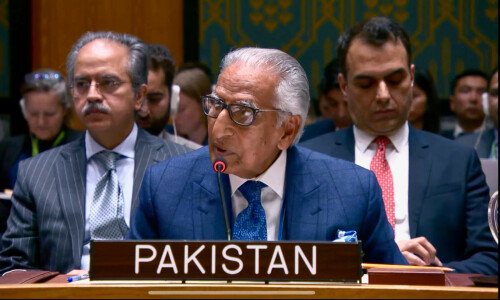ISLAMABAD: Justice Umar Ata Bandial on Friday disclosed that an incident, similar to what former Islamabad High Court (IHC) judge Shaukat Aziz Siddiqui had faced, had happened but prompt action was taken against the delinquent as the occurrence was reported to the chief justice concerned.
“The concerned judge had the courage to report the incident,” Justice Bandial said, adding that going public to vent apprehensions was “not courage but surrender”.
Though Justice Bandial did not divulge the identity of the judge who had faced interference in the affairs of the judiciary, legal experts believe that the incident involved an IHC judge and necessary action was taken against the individual involved in it. They say this means that attempts to undermine independence of the judiciary have not stopped.
Justice Bandial was heading a five-judge Supreme Court bench that had taken up an appeal by Shaukat Siddiqui against the opinion of the Supreme Judicial Council (SJC) and the Oct 11, 2018 notification under which he was removed as the IHC judge for his July 21, 2018 speech at the District Bar Association in Rawalpindi.
In his speech he had spoken about involvement of certain officers of the executive organ of the state, specifically the Inter-Services Intelligence, in the affairs of the judiciary and to allegedly manipulate formation of benches of the high court.
Justice Bandial says going public to vent apprehensions is not courage but surrender
On Friday, the federal government’s statement denying the former judge’s assertions about his meetings with ISI Director General Lt Gen Faiz Hameed was mentioned but Justice Ijaz-ul-Ahsan observed that the government’s reply was neither here nor there and it had no bearing on the present case.
Justice Bandial also observed that the court had nothing to do with the government’s reply and that senior counsel Hamid Khan, who is representing the former judge, should focus on the queries being raised by the judges.
The observation came when Mr Khan reiterated that the affidavit of the former judge was returned by the registrar office of the apex court but the vague reply of the government was put on record.
The counsel argued that the SJC in its opinion drew adverse opinion against his client without providing him an opportunity to explain his position.
Had the SJC held an inquiry before issuing a show-cause notice to Shaukat Siddiqui, he could have an opportunity to record evidence and then cross examine the witnesses, mainly the bosses of the intelligence officers.
However, Justice Bandial observed that the former judge went to a wrong forum and emphasised that when a judge spoke in public, he was seeking help from the public and the bar.
He recalled that Justice Qazi Faez Isa had written three letters to the president with a request to provide him the copy of the reference against him about which he had learnt from the media but he denied that he ever put the copy of these letters in public circulation.
“Thus the factual dispute is non-existent in the present case since no one denied that Justice Siddiqui did deliver the speech at the bar,” Justice Bandial said.
He regretted that the former judge neither informed the chief justice of Pakistan nor the chief justice of the IHC about the interference by intelligence officials.
“If we go public to publicise our apprehensions, feelings and complaints, we are not doing our job of strengthening the institution of the judiciary,” Justice Bandial observed.
Contrary to what is done in many countries where judges are impeached through parliament, in Pakistan instead of the executive or the legislature, peers decide the fate of judges, Justice Bandial pointed out.
When delivering the speech at the bar was an admitted fact, what was the need of holding an inquiry, he asked.
Hamid Khan argued that the cherished concept of protecting independence of the judiciary could only be secured by following procedures in a transparent way.
“Don’t you think that instead of the judge taking action independently, collective response by the entire institution would be a better choice in pushing back the perceived attack on the judiciary and help fizzle out the interference,” Justice Bandial asked.
The counsel replied that four times his client sought appointment of the chief justice but was not provided the chance.
Justice Ahsan said the former judge did not give anything in writing.
The counsel contended that he had a reservation that no contempt proceeding was initiated against the intelligence officers concerned by the high court chief justice who shifted the entire burden to the shoulders of Shaukat Siddiqui.
Only the judge concerned could initiate contempt proceedings or the chief justice when the incident was reported to him, Justice Shah said.
“You are making a point that we should initiate contempt proceedings,” Justice Bandial observed. “We would do that if we think there is a need but right now we don’t want to digress.”
The court then postponed further proceedings, to be resumed before June 30 — a date when Shaukat Siddiqui was supposed to retire had he still been officiating as the judge, instead of being removed.
Published in Dawn, June 12th, 2021
















































